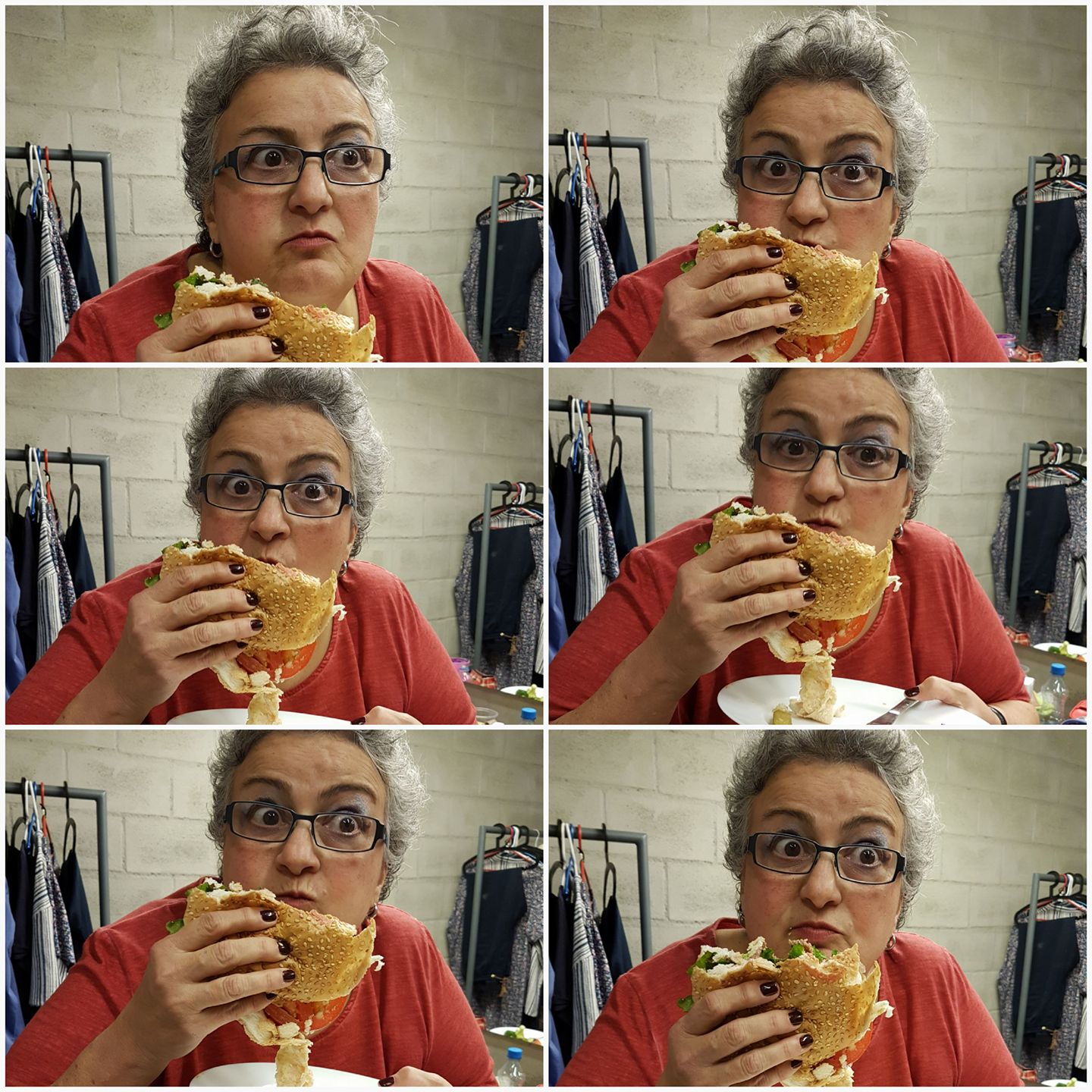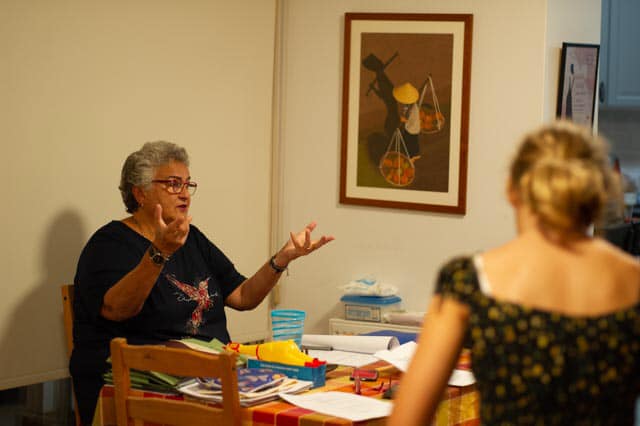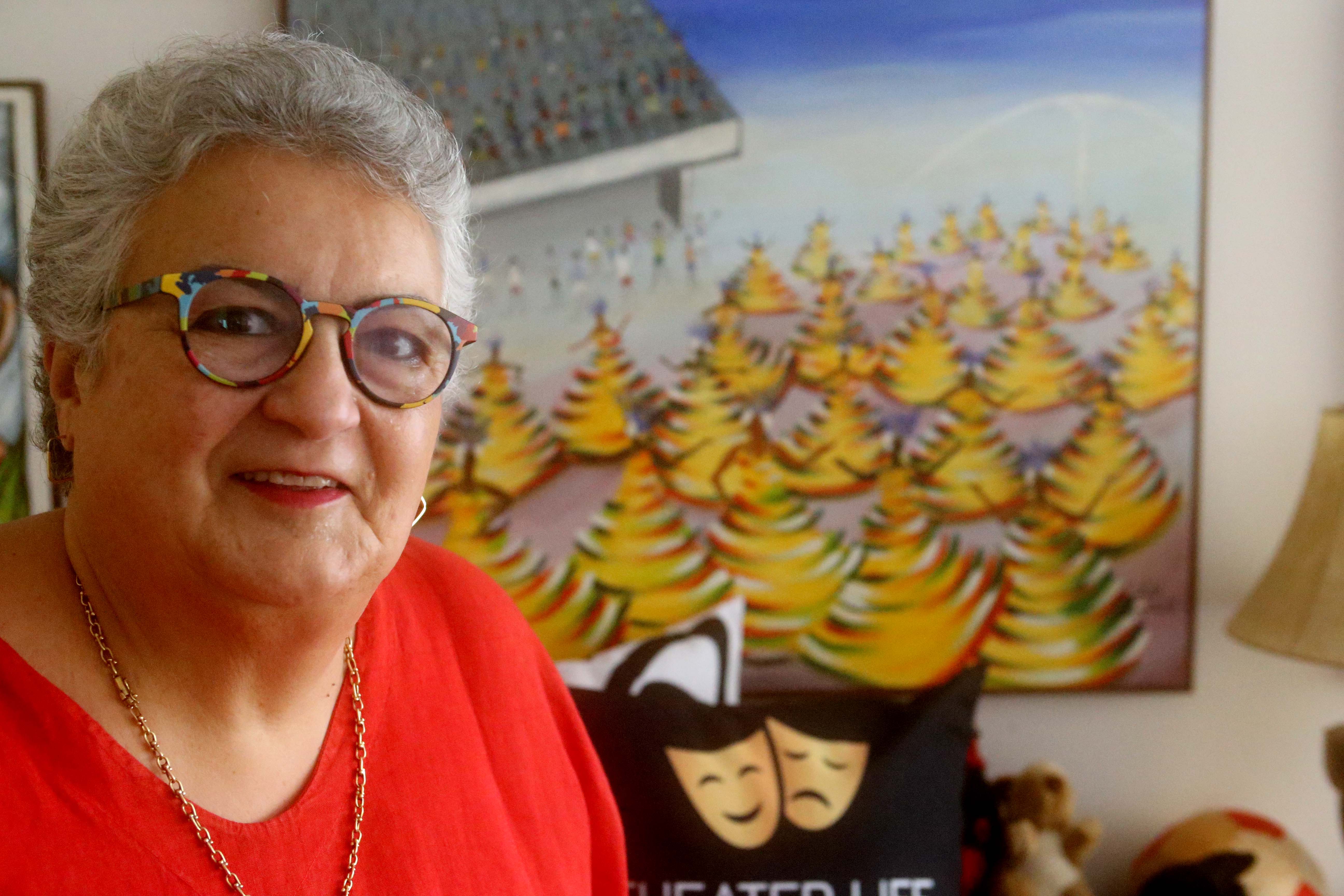In a formidable theatre lover who says she is only fake when on stage, THEO PANAYIDES finds a big personality who has not allowed being a woman to stand in her way
Monica Gavrielides is someone you remember. She talks loudly – so loud she’ll often embarrass more self-conscious companions – in a musical accent honed by 40 years in Brazil and America. She’s bedecked in red (or possibly crimson) on the day of our interview, her wrists adorned with bracelets and a futuristic-looking contraption called a Magneto watch. (“I saw it online. I bought it in the middle of the night.”) She’s a big personality, and has been since childhood. “I was always this thing,” she declares blithely, sitting in her Strovolos apartment while a rescue dog named Samba sniffs at me curiously.
She’s honest about everything: her single-woman status, her experience with depression, her chronic weight issues. “Usually overweight people dress in black,” she shrugs, “and maybe blue and brown – but I don’t care! I mean, I wear a lot of colour… I don’t have anything that’s beige.” She’s not fake, that’s her whole trademark. “For me to fake something, I have to be on stage, there has to be applause at the end. Otherwise, what you see is what you get. This is Monica.”
Being on stage is a reference to her lifelong love affair with theatre, mostly amateur dramatics though she’s had some paying roles along the way. (“I’d consider myself semi-pro.”) We meet a few days after Beyond the Spotlight at Theatro Dentro – an anthology, written by various hands and directed by Monica, of three one-act plays and a monologue that was also the third production by Women’s Empowerment Theatre, a group she co-founded during Covid.

The name of her troupe is an indirect clue to the woman herself – because it sounds like the kind of militant feminism that makes non-believers roll their eyes, but in fact it began as a joke. Monica and her friends were sitting around trying to decide what to call their new venture – it had to be something to do with women and theatre – and suddenly, she guffaws, “this dirty mind of mine” came up with the perfect name, or more accurately acronym. Women’s Empowerment Theatre, a.k.a. W.E.T. – or indeed WET! Pun very much intended.
Monica’s energy is big, and potentially overpowering – but it’s light-hearted too; she’ll lead with humour whenever possible. That said, the name of the group isn’t just a joke. “I still consider myself a feminist,” she tells me. “I just don’t like to burn bras, I don’t want to be fanatic in that. I think you’re a feminist with your actions.”
Her own feminism took the form – above all – of forging a career in what was very much a man’s world, banking and finance in Brazil in the 80s. “I studied Business. I had my own CD store.” (That came later, for about five years in the 90s; she also did a stint at Silicon Valley Bank, in their wine division in Santa Rosa.) “I’ve worked in Chase Manhattan, JP Morgan, Chase Manhattan again, Credit Agricole, Bank of Boston – in very high positions.”
Doing what?
“Credit administration. I used to approve the loans. At one point, my boss and I together, we had a lending authority of one million bucks!”
Monica was always too brash, too irrepressible – too much, in general – to allow being a woman to stand in her way. She herself was always ‘empowered’ – but of course she was also part of the system. One (older, male) boss came on to her, and had to be fended off. Another justified the much bigger raise given to a male colleague on the grounds that he was married, whereas Monica was a single woman and didn’t need a raise. (She said nothing, “and of course I left” soon after.) Once, at JP Morgan, she recalls going to visit some clients: “There were 18 men at the table – and me”.

The issue wasn’t even that men felt threatened by her. At that time they were still a bit nonplussed, the general opinion being that women couldn’t get their pretty little heads around numbers and financial instruments. “Because here we are discussing multi-million-dollar loans, and I’m speaking their language,” she recalls. “And they’re going ‘Huh?’. So that was the barrier, at the beginning.”
“If I’d been a man, it would’ve been different,” she sighs. “I had a boyfriend once and he discovered how much money I made, which was like five or six – I dunno how many – times more than he made. Never called me back! That was the 80s… Today, you don’t think about that. But back then it was [there], and I was heartbroken.”
Is that partly why she never married, the double threat of a high-achieving woman with her big personality? Maybe, shrugs Monica pleasantly. She’s actually been proposed to, and declined because she didn’t feel “the certainty” – but it’s also true that she must’ve seemed slightly formidable, in her younger years. “My father used to say that I used to scare men away. But I scared men away because I was… y’know, this thing.”
The irony was that she wasn’t really a career woman, any more than she was a feminist – which is to say, not in the militant sense. She didn’t want to be a CEO, or battle her way up the corporate ladder. She enjoyed the banking jobs, but soon grew restless; too many rules, not enough creativity – and “parallel to that, I was always doing theatre. In Rio, always: two theatre groups, always in English – I was acting, directing. I was the Wicked Witch of the West in Wizard of Oz, I did Who’s Afraid of Virginia Woolf?. I did a lot of plays.”
“It was wonderful,” she sighs. “Life was wonderful… But then what would happen? I’d get tired of those jobs, and I’d quit”. The typical trajectory, in Brazil in her 20s and early 30s, was that she’d get weary of corporate life “and I’d saved enough money to do something crazy. So I’d go to New York for six months”. She did odd jobs – in an art gallery, or a travel agency – then “the money would finish” and she’d call up the headhunters, seeking a job in a bank again.

This may be a good moment to mention a relevant detail (possibly the key detail) to understanding Monica Gavrielides. She’s done the test to determine which half of her brain is more dominant – whether it’s the left or right hemisphere – done it again and again, and it always comes out 50-50. She’s split down the middle, or perhaps more accurately viewed as two different temperaments running in parallel.
“So I have this – aaaahhhh, pellara! [craziness],” she explains, waving her arms like a crazy person – “but you give me an Excel spreadsheet, I love it! I love numbers. I like to organise”. In a sense, the bifurcated character is both her strength and her weakness. It’s surely made her more interesting, the kind of person you remember – but if she’d had a single-minded focus, a more obsessive kind of brain, allied to her big personality and dynamic energy… well, who knows where she might’ve ended up. Monica’s life has been successful – but she’s neither a millionaire nor a famous actress, and she might’ve been either.
The pellara has always been there, from her days as a naughty little girl and incurable chatterbox. “I mean, at PTA meetings the nuns would go: ‘Mrs Gavrielides, she’s so good, so polite’ – I was an excellent student – ‘but Mrs Gavrielides, she doesn’t shut up!’.” The nuns would move her next to a ‘quiet girl’, only for the quiet girl to come out of her shell and start chatting. They’d move her to the back of the class with the boys – but it was no good: Monica would talk to them too.
The nuns were in Rio, at the American school; Mrs Gavrielides was Brazilian, Mr. Gavrielides – Monica’s father Haris – was a Cypriot. The couple had met in the US, while doing their respective Master’s, and fallen in love at first sight. He moved to Brazil, where Monica (their only child) was born in 1959 – then back to Cyprus in 1962, having been offered a position by Makarios as the first governor of the Central Bank of Cyprus.
The family lived here for three years; she has wonderful memories of running wild with the neighbourhood kids as a four-year-old, whizzing along on roller skates “that you had to tie on your shoe”, or getting stuck in lemon trees and having to be rescued. Alas, her dad fell prey to “political issues” and resigned in 1965, moving back to Brazil and a job at IBM. He never returned to Cyprus, even to visit (Monica herself only came back in 2006), and comes off as a little bit of a tragic figure – a very correct, very cultured man who later introduced his daughter to Baryshnikov and the Bolshoi, and must’ve been deeply offended by the cronyism he found here.
He died suddenly in 1996, of a heart attack, during the years when Monica ran her own CD shop in Rio. Two years later, with the CD market in decline, she decided to fulfil a long-term dream and move to the US. She and her mother went to New York, planning to rent a car and look around (“We joked it would be a well-behaved Thelma and Louise road trip”) – but her mum passed away in New York, also very suddenly and shockingly, leading to the years of darkness when Monica’s extroverted energy seemed to turn inwards, her strong-willed charisma boomeranging into a malevolent force that battered and weighed down her psyche.
“I was feeling lost,” she explains. “Between my father’s death and my mother’s death I had endometriosis, so I had to take my uterus out – so I lost my father, I lost my ability to be a mother, and my mother, in three years.
“So when my mother died – let me tell you why I became an atheist – I’m like ‘Fuck, this God doesn’t exist’. I mean, what the fuck! I have no brother, no sister, no father, no mother, no husband, no children. What the fuck did I do?!” She shakes her head: “I went through a huge depression. It was really hard… It was very hard.”
Monica left Brazil and moved to California (she’d studied at Berkeley, and had some good memories) – but slid further and further into darkness. “I ate,” she recalls. “I ate non-stop, and I watched TV.” She found a job, but quit a few months later. “A depression takes you over slowly,” she muses. “It takes its time. It takes its toll… And then, when you hit rock-bottom and start planning your suicide, then it’s almost too late”. She was indeed thinking of suicide (“I was thinking gas, because I had a gas stove. That was my go-to”), now all alone in Nevada – “and I was putting on weight, and putting on weight”.
Three things saved her. The first was an intervention by friends, who convinced her to go see a therapist. The second, she reports with her usual honesty, were antidepressants, which she took for over a year. And the third was a dog named Figaro – “Bless him!” – who gave her companionship and a purpose in life, something to take care of. “I can’t imagine life without a dog,” she says now, Samba being the third in a line of redemptive pets – and in fact there’s also ‘Barkingham Palace’, her new project, a kind of boutique hotel (housed in her flat) for dogs while their owners are away.
New project? Yes indeed – because that’s the punchline, the final bit of the puzzle. Monica turned 65 in April and is now retired, moving into “the third act” of a fairly dramatic life.
“I want to do theatre, and I want to take care of dogs,” she replies when I ask about her plans (she’d also like to teach theatre; unsurprisingly, she relates well to teenagers). “Theatre, dogs, beach, travel, friends… To create an atmosphere of happiness around me, that’s what I try to do. Be with happy people, be with people who enjoy my company. And I have tons – thank God! – I have loads of friends.” Monica stops, chuckles wryly: “Look at an atheist saying ‘Thank God’”.
Friends, you might say, are her stock-in-trade – no surprise for a woman who loves to talk, a connector and people person. She’s already organised two reunions while in Cyprus, of her high-school classmates and her old Berkeley friends: “I used to be called ‘the glue of the group’”. She has no need of a partner, she assures me, friends (and dogs) are enough. Her third act looks like being lively, like the first two, just a bit more relaxed; after all, she’s never really changed. She is what she is – in short, she’s Monica. What you see is what you get.







Click here to change your cookie preferences